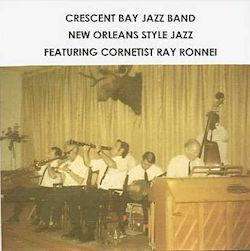
|
CRESCENT BAY JAZZ BAND— New Orleans Style Jazz Featuring cornetist Ray Ronnei
|
My Little Girl*; Savoy Blues; Tiger Rag; How Long Blues*; Hindustan; Early Hours; Original Dixieland One-Step; Burgundy Street Blues; Whenever You’re Lonesome; Blue Bells, Goodby [sic]; Copenhagen.
Ray Ronnei, cornet, vocals*; Roger Jamieson, trombone; Ron Going, clarinet, co-leader; Ron Ortmann. piano, co-leader; Buddy Burns, string bass; Douglas Parker, banjo; Sam Greer, drums.
Recorded in July 1971 at Fishface Sam’s, Santa Monica, California.
The musicians playing on this CD were all from Southern California and were probably little known outside of that geographic area since they did not tour in the U.S. or abroad. They played in different musical combinations at the time, the longevity of this one being of short duration like so many others. Of the group, one was a standout: Ray Ronnei. He was a unique brass player, one of those who are readily identifiable after just a few notes. His attack with its frequent flurries of staccato bursts, coupled with a shimmering vibrato, captures the listener’s attention right away—it is both intriguing and exciting.
Ronnei is ably abetted by the other two in the front line. Going is a towering presence, weaving notes all around, above, and below Ronnei, reminding one of the filigree of the iron balustrades of the balconies in the French Quarter of New Orleans. He is facile in all registers, executing flawless runs, and with just the right touch of vibrato, all of it with nary a screech to be heard. On trombone Jamieson provides depth and support, using glissandi judiciously and stating the melody where needed.
The rhythm section is not of quite the same caliber as the front line. Ortmann’s piano provides a adequately solid base, Parker is good support for the piano with his chording on banjo, but Burns is barely audible, and Greer seldom heard. There are occasional solos and breaks from Ortmann and Parker, but none from bass or drums. The burden falls on the front line, and they shoulder it with ease.
Most of the tunes in the program should be quite familiar to most listeners, but they are given a fresh treatment here. It’s not more of the “same old … same old ….” The cornet will launch a tune, followed by the clarinet and the trombone for a satisfying ensemble treatment. Tempos of many numbers are brisk, but the blues are not rushed. In particular, Going pays a nice tribute to George Lewis on the latter’s Burgundy Street Blues.
On a slightly negative note, the sound is somewhat variable. One can tell it’s a live performance, although there is little or no applause as each tune is cut off abruptly at the end and the next follows almost immediately. It seems there was only a single microphone which was being moved around, resulting in an imbalance on occasion. Clearly each instrument was not individually miked—a pity—but there is no available information on the recording set-up.
All aficionados of the New Orleans style of jazz will welcome this addition to what is currently available. Ronnei’s contribution alone is worth the cost of the purchase.
Bert Thompson
Merry Makers records are available at several on-line outlets, such as cdUniverse and Amazon, and from City Hall Records, 101 Glacier Point, Suite C, San Rafael, CA 94901, tel. 415-457-9080.